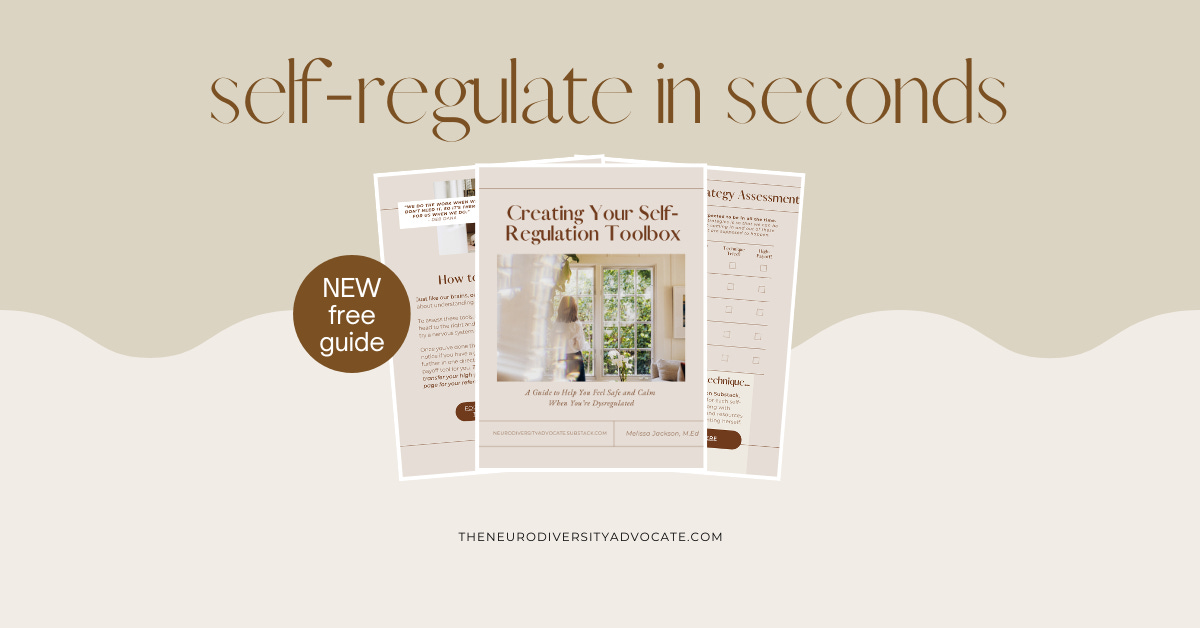Hey guys,
I just got back from a three-day retreat in Palm Springs, with Danny Morel. He does these events called Awaken.
And I will tell you, it opened up my heart and my capacity to be with a lot of things, in a new way.
That amongst a lot of work I've been doing internally to:
befriend
heal
and better understand my nervous system.
It’s all really compounded and I'm just feeling different. If you've been with me for a little bit, you know, I've struggled with how to feel the things in my body that I understand within my mind.
I think this is something that a lot of us battle with. My friend Britt Piper, whose interview I’ll share next week, said:
“Overthinking is an under feeling problem.”
I don't know about you but I'm a huge over-thinker.
I am very good at thinking.
Overanalyzing.
At doing.
At reading the books. Following the directions. Consuming the information.
Applying it to my life. Checking the boxes. Making the to-do lists.
I’ve been good at that my whole life.
Then it all became clear…. that’s a strategy to avoid feeling.
And that awareness cracked me open.
But also came with a willingness and desire to dive in, reconcile and figure out:
Why am I so disconnected?
Why am I so disassociated?
As a society, there's so many band-aids out there, right?
So many tips and tricks, medications, or even avoidance strategies that we adapt to not be with us. To not be with ourselves because we're so terrified of what we might feel.
I'm that person who's like, put me in coach! I want to do all the things but I think the way I've been going about it has only been through my head.
Let me learn.
Let me do.
Let me consume more information.
And now I'm finally at this place of:
Let me be.
Let me feel.
Let me embody.
And that’s why I've been bringing you guys a lot of strategies with emotional regulation like my NEW toolkit freebie to help you keep track and stay organized with the different high payoff tools for your nervous system.
Having strategies that ground me into my body- connect my body to my mind.
As people with ADHD, many of us have complex trauma. We struggle with emotional regulation and we're highly sensitive. We feel things really deeply and so no wonder we try to run away from our feelings…. Cause it hurts. It's intense. We've been told it’s too much.
We've internalized this idea that:
We are too much.
Our feelings are too much.
There's something wrong with feeling so much. With crying, with having big emotions.
We’ve been shamed for that, you know?
So it makes so much sense why we’d be running from it, hiding from it, looking for ways to suppress. But I think that there comes a point in our life where we're desperately longing to feel.
This journey has not been comfortable.
But I'm starting to create more space in my nervous system to be with myself. I'm starting to create more space around those moments where I’m dysregulated or triggered:
To be with
To get curious
To do this radical thing of getting to know myself
And what I actually need
Think
And feel.
And separating that away from the people pleasing, what people think of me, the perfectionism… all these adaptive strategies so many of us have taken on in an effort to stay safe, to feel loved, to feel accepted.
Tearing all of those things off to just be with yourself is very vulnerable. But it’s an entry point into creating enough space to be in your body. To be with whatever's there. To stop running from it. And to not judge it.
If we feel mad, sad, angry, frustrated or overwhelmed- we can look at our emotions as our teachers. They're wisdom within our body that let us know about an unmet need we have within ourselves.
When we can stop judging or labeling the emotions and instead, get curious with what comes up within us….
Asking ourselves…
What is this here to show me?
What is this here to teach me?
How do I feel and why do I feel this way?
This is when the Reparenting stuff really comes in because we've got these parts of us that are stuck in moments in time in our life where we've experienced some trauma.
That five-year-old me that's traumatized from feeling unseen, unheard, unaccepted has a different feeling than that 16 year old me, who is mad that I'm not being validated. Mad that I can't be myself and that I'm not receiving love in the way that I need.
When we shame these parts of ourselves it just shuts it all down.
It causes more dysregulation and it causes us to disassociate from our body and our feelings.
So creating a greater window of tolerance to, be with and curious about these different parts of ourselves and what they're here to show us and teach us, is an amazing gift and an opportunity to heal.
When we can start to find ourselves in our body, to be with the discomfort in new ways, it allows us to:
Start to feel empowered
More self-assured
And it creates more self-trust.
It's like a vicious cycle but with positive thought loops and healing.
When we're just curious and we're not making any of it wrong or bad, our body feels safe to show us more.
Truly the other day, you guys, I looked in the mirror, and I'm like, I don't even recognize myself. I look so different.
And I look different because I'm this version of me that didn't exist before.
I'm this version of me who knows myself
Who loves myself
Who trusts myself
Who isn't judging the thoughts that come up anymore.
I can hold space to be curious, understanding why this part of me would feel this way and asking for my body to tell me more.
And when we do this work as mothers, it makes showing up for our kids a thousand times easier.
I was a teacher and then when my first child was born (my kids are 16 and 13 now) I became a full-time mom. I stopped working because, 16 years ago me, dedicated her whole life to being the “perfect mom.” I wanted to give my kids everything I didn't get.
So I read all the books.
I didn't have a babysitter, except for grandparents, and took care of them myself.
And from this limited understanding of what it meant to be a perfect mom, which let's be clear is completely impossible and there's no such thing, I was doing all the things I knew to do.
I don't know if you’re familiar with Gabor Mate’s work, Scattered Minds, it's a fascinating read for anyone who's interested in learning more about epigenetics, attachment and attunement with our kids and how that can impact our neurowiring.
But now I look back and, both cringe and give that version of me so much love and compassion, because she thought she was doing it right.
She was trying so hard. And yet so unaware of her unhealed trauma and how that was playing out in her availability to be present and attuned to these little babies.
Why is cycle breaking so hard?
» Because I didn't get it from my parents.
And why?
» Because they didn't get it from theirs.
So when we can take the, making it personal, out of it and see the neutrality in it and see that this makes so much sense that my mom couldn't give me what I needed because her mom couldn't give her what she needed and her mom couldn't give her what she needed.
Of course I was repeating cycles because I wasn't aware and no one had showed me otherwise.
So it's this active work right?
To create the secure attachment to ourselves, which is really what reparenting is. Showing up as that safe space within ourselves so that we can create a secure attachment with our kids.
And for the record, the gift of repair really does repair.
If we don't show up the way we want, we don't have to beat ourselves up and hide in shame about it. We can own our humanness and make it right.
The point of me sharing this all is that when I originally came to this work, I started with the band-aids, which I think so many of us do.
Coming from the classroom setting, being a teacher, I was like, what do I do in the classroom to make things right. That's the problem.
And then I realized, there's stuff happening at home too. So I thought: Okay. What are we doing with kids at home? Do we have all the tips and tricks? All the executive functioning strategies? All the things in place to support the accommodations at home?
Again, it was the doing, doing, doing.
Am I doing all the things? Am I reading all the books?
And I was still left, like, dang, I know so much and it's still a struggle. Something is still off.
So I just kept whittling back to: What’s the root? How do we really create change?
And I've come full circle to: The root is healing our own nervous systems as primary caregivers, as mothers, as women who, I'm just going to say it, the vast majority of us have complex trauma- especially if we're neurodivergent.
Looking at these reactions and sensations that are coming up in our bodies, as wounds from unmet needs in our youth, allows the grown-up version of us to address and meet those needs now.
To create that security, that safety, that self-trust.
Because we're not trying to get it from anyone else anymore.
And ultimately, this allows us to hold space so we can co-regulate and support our kids.
They're so energetically in tune with us and our nervous system and our emotional space- it’s amazing what a difference working on ourselves makes for them.
That is empowerment. We are in control. We create our realities. We create our experiences. It always comes back to us.
So this is a conversation I'm going to be leaning into more. I'm very fascinated with:
How complex trauma shows up for so many of us with ADHD.
Gabor’s work with attachment and attunement.
And just looking honestly at my own life to talk through generational trauma and epigenetics.
I would love to hear if you have any thoughts, feelings, or if you can relate?
The nervous system needs us to baby step into these things. So stay tuned for these episodes where we'll dive deeper into it all.
Talk soon.
P.S. Looking for support in reparenting yourself? I’m here for you. Click here to learn more about my 1:1 packages.
























Share this post